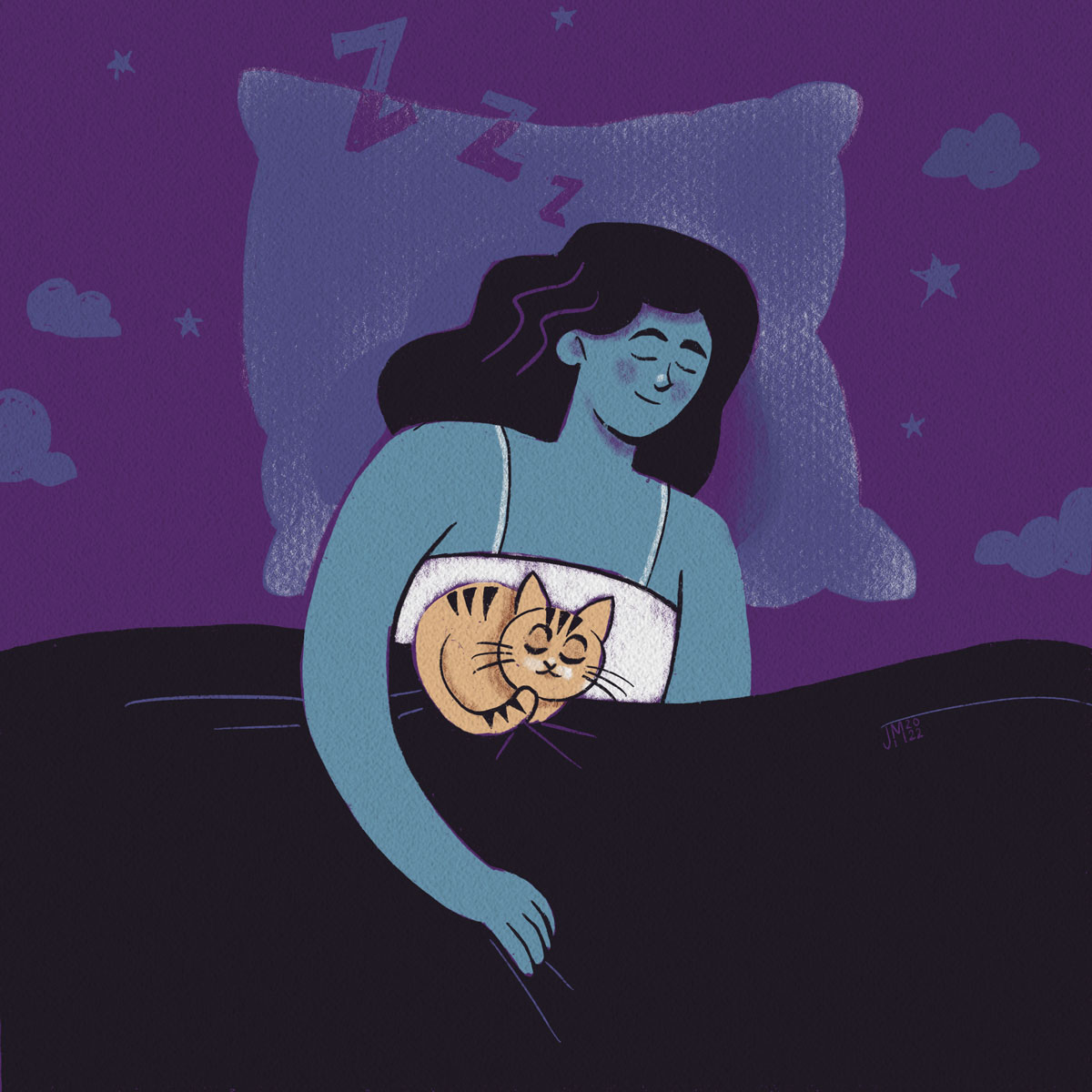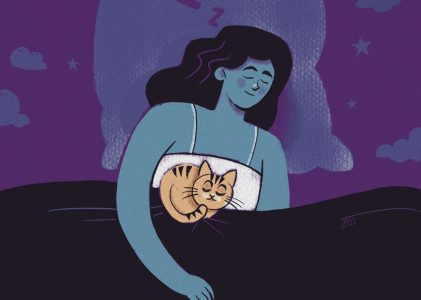Insomnia makes life hard. Fortunately, effective treatment is available, and you can even try it at home tonight.
It’s 4 am and you’re awake… again. You flip over, snuggle into your pillow, and try to get back to sleep. Nothing happens. “Please don’t think, please don’t think,” you implore your busy mind, desperate for a wave of drowsiness to sink you into sleep.
Sleep does tug at you for a blissful second but then vanishes like a skittish kitten noticing you notice it. No, no, please don’t go! You want that kitten more than anything. Surely, you can coax it back if you do just the right thing.
You take a few deep breaths, but the air feels invigorating. You try to think of something dull, but quickly lose interest. Your heart thuds, your mind races and you know it’s over. No sleep for you!
So, now what?

What is chronic insomnia?
Do you find yourself chasing sleep a lot these days? Do you lie in bed, unable to fall asleep or stay asleep for 3+ nights per week? Has your sleep trouble lasted 3 months or longer? If so, you might have chronic insomnia.
At any given time, about one in 10 US adults experience chronic insomnia [1]. If you’re one of them, you know how devastating persistent sleep trouble can be for your mood, your productivity, your health, and your relationships. Just about everything suffers when you sleep poorly a lot of the time.
What causes chronic insomnia?
There are many things that may cause insomnia, including:
- Personal or environmental factors like stress, your work schedule, poor sleep habits (e.g., keeping an erratic sleep schedule, playing video games in bed, taking naps, etc.), or eating a lot right before bed.
- Substances like caffeine, nicotine, alcohol, or certain medications.
- Mental health conditions such as anxiety and depression.
- Medical conditions such as chronic pain, cancer, overactive thyroid, and more.
- Sleep-related disorders like sleep apnea or restless leg syndrome.
While there are many causes of insomnia, the most common ones are stress and habits that disrupt sleep [2]. Fortunately, you may be able to improve your sleep habits and reduce the impact that stress has on your sleep.
What should you do if you can’t sleep?
About the worst thing you can do for insomnia is to lie in bed restless, frustrated, and unable to sleep. The more often you do that, the more you strengthen an association between your bed and your sleep trouble.
Consequently, if it takes you more than 20 minutes to fall asleep, sleep experts advise that you get out of bed and do something non-stimulating until you feel drowsy. You can then get back in bed and try again.
This routine is fine for the occasional night of poor sleep. However, if you develop a consistent pattern of trouble falling or staying asleep, a more intensive and structured approach might be necessary to break your poor sleep habit.
Cognitive-behavioral therapy for insomnia (CBT-i)
Fortunately, CBT-i can alleviate insomnia as effectively as medication but without side effects. While it takes more effort to learn and practice CBT-i techniques, people who utilize CBT-i tend to have fewer episodes of relapse and their sleep tends to continue to improve long past the end of treatment [3].
The Five Components of CBT-i
1. Sleep Restriction (AKA Sleep Consolidation)
Sleep restriction aims to limit the amount of time you spend in bed and gradually increase that time as you’re able to remain asleep in bed for longer and longer periods.
By restricting your time in bed, your sleep drive builds up. When you do climb into bed, you’ll probably fall asleep and stay asleep more easily.
Note: If you’ve experienced manic episodes ever in your lifetime or if you have another condition that could make you especially sensitive to sleep deprivation, please consult your doctor prior to experimenting with sleep restriction.
Sleep Restriction Steps:
- The first step is to calculate how many hours of sleep you got per night last week, on average. This will determine your initial time in bed, with the goal of getting a minimum of 5 ½ hours (even if that’s more than you actually slept).
- Next, figure out what time you want to get up in the morning and count backward by your sleep total (or the 5 ½-hour minimum) to calculate what time you should go to bed. So, if you want to get up at 7:00 AM and your sleep total is 5 ½ hours, your new bedtime would be 1:30 AM.
- Going to bed at 1:30 AM may sound harsh, but after a week or so, you’ll probably spend much less time awake in bed. At that point, you can gradually increase your time in bed by 15 to 30 minutes, as long as your time awake in bed remains minimal.
- Next, calculate your sleep efficiency, or the percent of time you sleep relative to the time you spend in bed. If you’re sleeping 6 hours and spending 7 hours in bed, your sleep efficiency is 6/7 = .86 or 86%.
- If your average sleep efficiency is 85% or more, you can extend your time in bed. If it’s below 80%, reduce your time in bed. Otherwise, your time in bed remains the same.
- Wait at least a week after each new extension before increasing your time further.
2. Stimulus Control
Frequent episodes of struggling to fall asleep in your bed condition you to associate your bed and bedroom with anxiety and wakefulness. To break this association, CBT-i instructs you to use your bed only for sleeping or sex. All other activities, such as reading on your phone, watching TV, eating, playing games, etc. should take place in another room (as difficult as that may sound).
If you turn out the light and can’t get to sleep within 10 minutes, go to another room and do something relaxing and non-stimulating until you feel sleepy. Don’t look at your phone or do anything that resembles work. You might try doing a meditation practice, stretching gently, or reading a boring book.
Once you feel sleepy, go back to bed. If you still can’t sleep, repeat this process. This might feel very challenging but it’s necessary to break the association.
3. Cognitive Restructuring
In the process of struggling to sleep, you’ve probably developed some negative thoughts and beliefs about sleep. It’s common to dread going to bed or worry that you won’t get enough sleep to function the next day. Unfortunately, these thoughts can make it even harder for you to fall asleep.
Cognitive restructuring means changing these thoughts to be more constructive. You might replace your negative thoughts with more positive ones like these:
- “I’ll be okay, even if it takes a while to fall asleep.”
- “I probably get more sleep than I realize.”
- “I can let go. I can trust my body to sleep.”
- “I may not feel good tomorrow, but I’ll be able to function just like I’ve done many times before.”
If you work on replacing your negative thoughts with more positive and realistic thoughts, you may feel less anxiety about going to bed. This may also help you fall asleep more easily, either when you first go to bed or if you wake up earlier than you’d like.
4. Sleep Hygiene
Sleep hygiene is a set of guidelines that promote healthy sleep. They often include the following:
- Go to bed at the same time each night and wake up at the same time each morning. You may not be able to keep a consistent bedtime while managing insomnia but do try to wake at the same time each morning.
- Avoid eating or drinking alcohol 2-3 hours before bedtime.
- Avoid bright lights 2 hours before bedtime.
- Decrease your exposure to screens 1-2 hours before bedtime.
- Avoid caffeine in the afternoon and evening.
- Spend the hour before bedtime unwinding the stress from your day. Focus on relaxation and self-care.
- Expose yourself to bright outdoor light in the morning or early afternoon.
5. Relaxation Techniques
These techniques can quiet your mind, relax your body and help you ease into sleep.
- Slow, deep breathing
- Progressive muscle relaxation
- Mindfulness meditation – this is especially useful for helping you learn to observe your thoughts dispassionately. If you notice an anxious or negative thought, you can recognize it and let it go.
Next Steps
We hope these steps help you get better sleep. If they don’t, you might benefit from working with a trained professional who can tailor a sleep treatment program to fit your needs.
If you’d like professional help with your sleep, call your doctor or contact Athena Care, for mental health care in Tennessee.
One of our Care Coordinators will help you get the care you need.

Rachel Swan, MS
Editor
Rachel has a Masters of Science in Clinical Psychology from Vanderbilt University, where she spent 16 years as a Research Analyst in the Psychology and Human Development Department.


